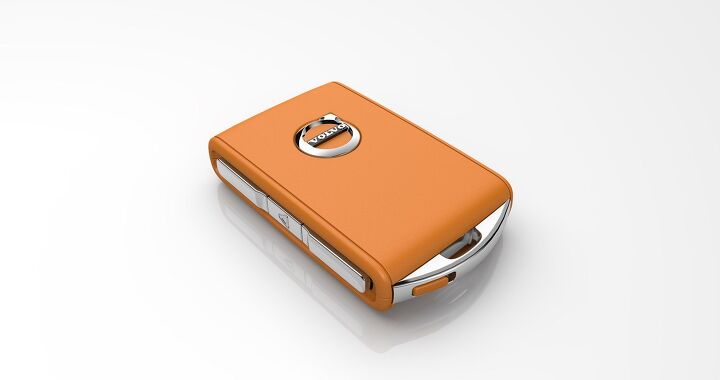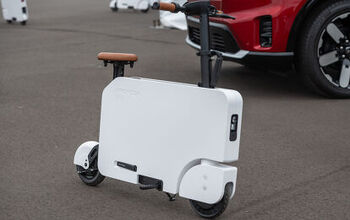Here's Looking at You, Kid: Volvo to Deploy In-car Cameras to Monitor Your Behavior

Volvo has burdened itself with the unrealistic duty of ending fatalities in its cars. While an admirable goal, eliminating roadway mishaps in their entirety is an exceptionally tall order. We’ve often wondered how the company intends to progress toward its zero-death target. The automaker has already said it intends to reduce speeding by limiting the top speed of all models to 112 mph.
On Wednesday, the company said it will introduce an orange “Care Key” that allows owners to apply whatever maximum velocity they desire (below 112 mph) and an in-car camera system designed to keep you from misbehaving behind the wheel. Volvo’s commitment to safety seems to exist without boundaries, but it leaves us wondering how far is too far.
The Care Key is simple, straightforward, and not a terrible idea. Volvo frames it as a way to keep younger drivers from breaking the law or driving beyond their limits. The company is also inviting insurance companies in several markets to offer special, favorable insurance to members of the Volvo community using its new safety features — which is something we’ll come back to in a bit.
From Volvo:
Håkan Samuelsson, Volvo Cars’ chief executive, said this month that the company wants to start a conversation about whether car makers have the right or maybe even the obligation to install technology in cars that changes their owners’ behaviour. Now that such technology is available to use, this question becomes even more important.
The speed limit and the Care Key are both part of that initiative and illustrate how car makers can take active responsibility for striving to achieve zero traffic fatalities by supporting better driver behaviour.
“We believe that a car maker has a responsibility to help improve traffic safety,” said Samuelsson. “Our recently announced speed limit fits that thinking and the Care Key is another example. Many want to be able to share their car with friends and family, but are unsure about how to make sure they are safe on the road. The Care Key provides one good solution and extra peace of mind.”
However, the amount of peace of mind generated by the in-car camera system likely hinges on how palatable you find breaches in personal privacy. If you’re the sort of person that puts pieces of tape over your computer camera, this isn’t going to fly. But Volvo believes the system will help eliminate distracted, drunk, or drowsy driving. While it seems the automaker is still working out how exactly the system will function, Volvo claims it will appear on models donning its scalable SPA2 vehicle platform in the early 2020s.
Similar sounding to Cadillac’s Super Cruise system, Volvo’s camera will perpetually monitor the operator and assess how they’re doing. If their driving becomes erratic, their eyelids aren’t where they’re supposed to be, or they can’t keep their hands on the wheel, the car will slow itself and issue a warning to the driver. From there, Volvo On Call contacts the driver to make sure everything is okay. If the driver doesn’t respond and/or their “behavior doesn’t improve,” Volvo will stop the vehicle entirely and dispatch emergency services, if needed.
While we love the idea of improved safety and the elimination of distracted or drunk driving, the notion of an always-on nanny cam for adults is slightly unsettling. Almost everything we do online is shared, scrutinized, and sold. What’s stopping Volvo (or other manufacturers) from taking advantage of us or exercising an unsavory amount of control with connected cars?
Insurance groups endorse just about every safety net automakers and tech companies come up with. Meanwhile, manufacturers are seeking partnerships with insurance companies in the hopes they’ll provide discounts on models equipped with their newest safety systems, helping them convince federal regulators to green-light the technologies. Statically, the safest thing you can do right now is purchase the biggest car money can buy and consistently wear a seatbelt. But automated interventions are likely to provide additional safety support, provided you’re comfortable with the cost and understand how to use them.
However, critics complain that a sudden influx of sensors will make automotive repair bills astronomical, limit driving freedoms, cross the line of personal privacy, and further drive up MSRPs. Advocates counter these claims by saying reduced roadway fatalities are worth any sacrifice.
We’re interested in what you think.
[Images: Volvo Cars]

A staunch consumer advocate tracking industry trends and regulation. Before joining TTAC, Matt spent a decade working for marketing and research firms based in NYC. Clients included several of the world’s largest automakers, global tire brands, and aftermarket part suppliers. Dissatisfied with the corporate world and resentful of having to wear suits everyday, he pivoted to writing about cars. Since then, that man has become an ardent supporter of the right-to-repair movement, been interviewed on the auto industry by national radio broadcasts, driven more rental cars than anyone ever should, participated in amateur rallying events, and received the requisite minimum training as sanctioned by the SCCA. Handy with a wrench, Matt grew up surrounded by Detroit auto workers and managed to get a pizza delivery job before he was legally eligible. He later found himself driving box trucks through Manhattan, guaranteeing future sympathy for actual truckers. He continues to conduct research pertaining to the automotive sector as an independent contractor and has since moved back to his native Michigan, closer to where the cars are born. A contrarian, Matt claims to prefer understeer — stating that front and all-wheel drive vehicles cater best to his driving style.
More by Matt Posky
Latest Car Reviews
Read moreLatest Product Reviews
Read moreRecent Comments
- Analoggrotto Does anyone seriously listen to this?
- Thomas Same here....but keep in mind that EVs are already much more efficient than ICE vehicles. They need to catch up in all the other areas you mentioned.
- Analoggrotto It's great to see TTAC kicking up the best for their #1 corporate sponsor. Keep up the good work guys.
- John66ny Title about self driving cars, linked podcast about headlight restoration. Some relationship?
- Jeff JMII--If I did not get my Maverick my next choice was a Santa Cruz. They are different but then they are both compact pickups the only real compact pickups on the market. I am glad to hear that the Santa Cruz will have knobs and buttons on it for 2025 it would be good if they offered a hybrid as well. When I looked at both trucks it was less about brand loyalty and more about price, size, and features. I have owned 2 gm made trucks in the past and liked both but gm does not make a true compact truck and neither does Ram, Toyota, or Nissan. The Maverick was the only Ford product that I wanted. If I wanted a larger truck I would have kept either my 99 S-10 extended cab with a 2.2 I-4 5 speed or my 08 Isuzu I-370 4 x 4 with the 3.7 I-5, tow package, heated leather seats, and other niceties and it road like a luxury vehicle. I believe the demand is there for other manufacturers to make compact pickups. The proposed hybrid Toyota Stout would be a great truck. Subaru has experience making small trucks and they could make a very competitive compact truck and Subaru has a great all wheel drive system. Chevy has a great compact pickup offered in South America called the Montana which gm could make in North America and offered in the US and Canada. Ram has a great little compact truck offered in South America as well. Compact trucks are a great vehicle for those who want an open bed for hauling but what a smaller more affordable efficient practical vehicle.




































Comments
Join the conversation
one look around our world and it becomes fairly easy to conclude that humanity apparently needs all the 'monitoring' it can get...
I find it interesting how many folks seem to want to ascribe these changes to the Chinese. These are very Scandinavian/European ideas. The Swedes are very much in charge of how Volvo is running, and Geely makes money in the process... just like when Chinese folks invest in any other company. The controlling share hasn't done too much with Volvo. Under Chinese ownership, Volvo is building it's first cars ever in the US. So technically Merica is ahead with Volvo now more than ever before. Some XC60s and all the S90s are built in China, but that's really about it at this time. So long as it's an on off feature, I don't much care. Options are good things to have. I wouldn't want to get a car with it always on... because like everyone else pissed off about it, I'm sometimes a bad driver and wish to remain so. I wouldn't want it on my car for sure, but I am not gonna freak out over it until the government bans my use of pre computer automobiles on the road. That being said, Volvo has never tried to capture large segments of the market. They are expanding in popularity with their push into the lux market and it's hard to come down too hard on a company experiencing good growth in a generally down market.